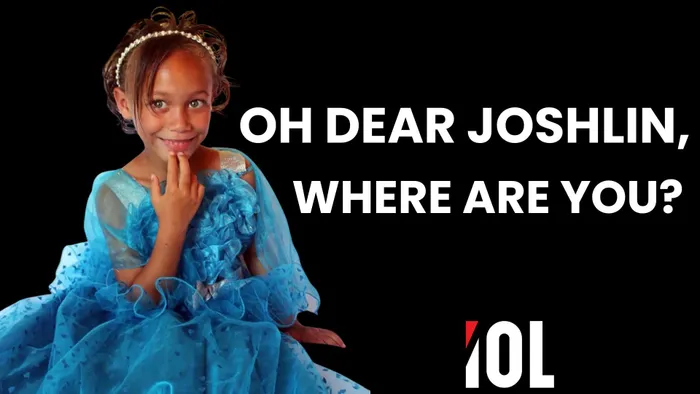WATCH: The search for Joshlin Smith continues, Saldanha residents will not rest - Robin-Lee Francke reflects

Despite life sentences handed down on May 29 to Kelly Smith, her co-accused, Steveno van Rhyn and Jacquen Appollis, for charges of kidnapping and human trafficking, the search for Joshlin remains desperate and unresolved.
Image: SihleMlambo/IOL
In a case that has gripped the nation and left a community in perpetual mourning, the search for six-year-old Joshlin Smith shows no signs of abating. Despite the recent sentencing of Joshlin’s mother, Kelly Smith and her co-accused in her kidnapping and human trafficking, questions remain unanswered—most pressingly, where is Joshlin?
IOL journalist Robin-Lee Francke has been one of those who have documented this story which has left South Africa collectively heartbroken.
In this video, Francke, who was in conversation with IOL’s content manager Devereaux Morkel, detailed the harrowing progress of the case.
The proceedings, marked by raw emotions and heated exchanges, revealed deep fissures between the justice system, law enforcement, and community expectations.
When questioned about the seemingly endless quest to locate Joshlin, Francke underscored a resolute message heard across public statements: “They will not stop the search,” affirming the unwavering commitment from authorities and countless volunteers mobilized to reunite the missing girl with her family.
The trial, which culminated on May 29, with life sentences handed to Smith, Steveno van Rhyn and Jacquen Appollis, cast a stark light on the disturbing actions of the adults implicated in the tragedy.
Central to the proceedings was Kelly Smith, the girl’s mother, whose behavior in court shocked many.
Observers noted that Kelly, frequently appearing more focused on gaining media attention than expressing genuine maternal sorrow, seemed detached—a stark contrast to the gravity of her child’s disappearance.
In stark moments during the trial, her only displays of emotion came when the camera was not focused on her, lending further credence to critics who questioned her involvement and personal integrity.
In an emotional recounting of events, Francke has recalled how Joshlin’s voice touched hearts nationwide when, for the first time, a video captured the innocent sounds of the missing child.
For many South Africans, the child’s gentle voice symbolized not only the sweetness of youth but also the urgent need for justice and protection against exploitation.
Despite life sentences delivered to Kelly and her co-accused—charges that include human trafficking and kidnapping—the core tragedy endures, as Joshlin remains missing. The sentencing, while a formal acknowledgment of wrongdoing, has done little to assuage the overwhelming sorrow felt by the community.
The trial also cast the spotlight on law enforcement and governmental promises. Officials confirmed that despite the harsh verdicts, exhaustive searches will continue.
Community members from Saldanha—and beyond—remain united, holding vigils and organizing morning search parties, even as despair looms large over the prospect of ever finding Joshlin alive.
Their collective determination is a powerful testament to a society that refuses to yield in the face of such unspeakable injustice.
As the courtroom drama fades into memory, the real story continues on the streets, with communities still praying for a breakthrough and questioning the efficacy of a fractured justice system, the fate of Joshlin Smith stands as a chilling reminder of the many unanswered questions that haunt modern South Africa.
What additional measures can be implemented to prevent such tragedies?
How will the ongoing search efforts adapt to new challenges?
The answers lie in the coming days as the nation rallies behind Joshlin’s cause.
Related Topics: